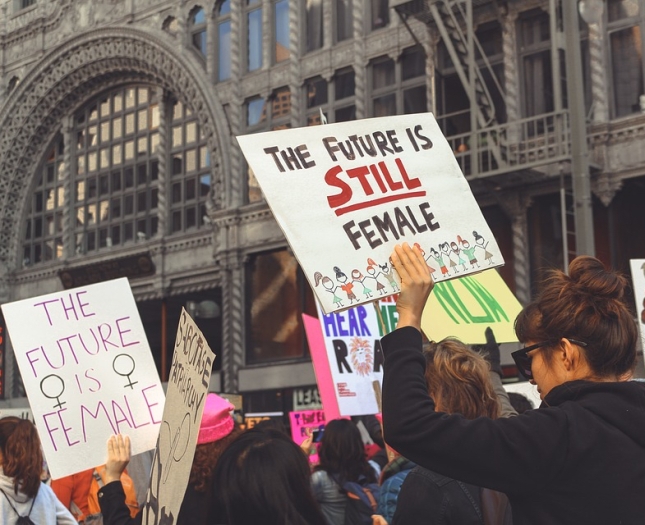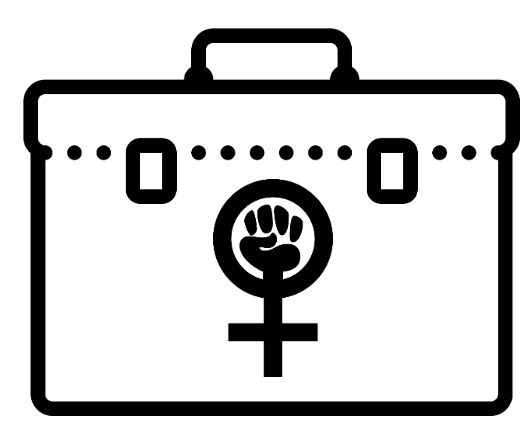This is the fifth and final in a series of posts about each of the teams that will be attending SCI 2019, and their projects. This one was submitted by Sandra Aya Enimil.
The scholarly communication ecosystem reflects in large part the prevailing modes of thought, knowledge creation, and knowledge sharing of the time. Building a scholarly communication project that is truly inclusive of existing voices, thoughts, and perspectives takes time, critical reflection, and iterative thinking. Building a feminist-centered framework for collaborative scholarly communication projects requires enacting an ethic of care to ensure that marginalized voices and perspectives are given the space they deserve and that invisible emotional labor is recognized and valued. This team of six women, who stand at the forefront of the scholarly communication work in their respective regions, institutions, and fields, comes together to explore what it means to build a truly inclusive, feminist-centered scholarly communication agenda, rooted in a foundation of equity.
Given the focus of our individual work and our collective proposal for this project, we are delighted by this year’s theme of “Equity in Scholarly Communications.” Each of us has experienced the inequities inherent in the scholarly communication landscape on a number of fronts. We know what it means to operate in a scholarly communication system rooted in inequity and oppression, and we are committed to bringing an intersectional—taking account of multiple levels of oppression (Kimberle Crenshaw, 1991)—feminist approach to bear in our work.
We recognize the need for a framework of practical tools to help fellow colleagues build scholarly communication projects, at all stages of the process that focus on true equity, inclusiveness, and shared value of labor. We seek to begin building an iterative, living, multi-lingual, crowd-sourced toolkit that focuses on best practices for the conceptualization, creation, and completion of inclusive scholarly communication projects. Whether the project involves interacting with marginalized communities to curate and manage collections of materials, developing decolonized and anti-oppressive descriptions and methods for discovery, or creating culturally sensitive publication and dissemination strategies for these materials and resulting research output, our goal is to begin the process of creating a living document that will address best practices for any of these scenarios across cultural and disciplinary contexts.
Our goal is to create and disseminate the first ever multilingual feminist centered living (read iterative living document) toolkit to address challenges and opportunities regarding Scholarly Communications that has practical use in local contexts
Challenges:
- The Team will discuss, identify and frame the misconceptions of what feminism is and what feminisms exist around the world.
- The Team will discuss and identify definitions of diversity and equity, that can be very different based on perspective, place, culture, politics, and context.
- The Team will discuss definitions of global – attempting to make this an honest project and sitting with the reality that “global” often used as a term without meaning.
- Importance of living document that solicits ongoing work from scholars in different areas and at different times.
- Cómo construir algo global cuando hay diferencias locales → necesitamos una caja de herramientas que pueda ser transculturado, no sólo traducido.
- The Feminist Toolkit is designed and intended to be transculturated and not just translated.
- El objetivo es crear algo muy práctico.
How we plan to share our work:
The members of the Team represent North, Central and Latin American and are eager to solicit contributions from other areas of the world that are not represented on our Team. Toolkit content will be open to be reused and remixed and customized for use in local contexts.
The Toolkit would utilize Open Source and ethical technologies, software, tools, and dissemination plan. In keeping with the requirement and spirit of structural and sustainable Openness, our Team’s deliverable of the Feminist Toolkit living document will be designed and built utilizing open
software such as etherpad. Following ethical educational technology practices: https://ethicaledtech.info/wiki/Meta:Welcome_to_Ethical_EdTech
We will:
- Promote the Toolkit via social media, international conferences and other venues
- Solicit and recruit additional contributions to the Toolkit from areas of the world that have not received the attention and that require languages beyond English
- Present, draft and share the results of the Team’s research broadly
- Continue monthly calls to discuss the project proposal and next steps
Project Member Bios:
Gimena del Rio Riande is an Associate Researcher at IIBICRIT-CONICET and Professor at the University of Buenos Aires, Argentina. She is interested in building an Open Digital Humanities community in Argentina. During the last five years she created the first DH Lab in her country, HD CAICYT Lab, and she worked on the publishing of the first Spanish Digital Humanities OA journal, the Revista de Humanidades Digitales, the organization of the Asociación Argentina de Humanidades Digitales, and the Argentinian OA Repository Project, Acta Académica. She also collaborates with many DH projects and consortia around the world (Force11, TEI, Pelagios Commons, DARIAH). Gimena brings her experience working with different academic communities (Anglophone, Spanish), where she has explored transculturation and decolonization approaches in the Humanities. She also brings her experience in OA policies and the DH and digital humanities scene in Latin America, this will help the team in expanding this framework to the Spanish-speaking community and to Global South perspectives.
Sandra Aya Enimil is the Copyright Services Librarian and Head of Copyright Services at The Ohio State University Libraries. At Ohio State, Sandra provides information and resources on using copyrighted materials and assists creators in protecting their own copyright. Sandra works with individuals and departments within the Libraries and across campus. She works closely with colleagues in various academic units, Legal Affairs, and the Libraries’ Special Collections and Digitization & Reformatting departments to name a few. She has also given numerous presentations on various aspects of copyright for faculty and staff at Ohio State and several other institutions. Sandra will contribute her knowledge and work regarding collections and the way libraries and archives interact with marginalized communities.
Sharon E. Farb is the Associate University Librarian for special collections and international collaborations and the chief policy strategist for the UCLA Library. She leads the units that enhance and unlock the Library’s rare and unique materials and guides the Library’s government relations and public policy efforts. Farb is a national leader on the role of the public research library in organizing and preserving knowledge and spearheaded the Library’s development of its Open Scholarship and Collections Policy and an active member of IFLA’s Copyright and Legal Matters Committee.
April Hathcock is the Scholarly Communication Librarian at New York University, a large research institution with a global footprint. Hathcock educates her campus community on issues relating to rights, access, and ownership of scholarly material across the research lifecycle. She spent her previous career as a practicing lawyer and interrogates her current work through the lens of legal infrastructure and how it relates to knowledge creation and sharing. Her scholarly research focuses on the feminist intersectionality, information justice, scholarly (neo)colonialism, and global inclusivity and representation. She is an active member of the Force11 Scholarly Commons Self-Critique Working Group and can bring her work on building a globally inclusive scholarly infrastructure to this Triangle SCI project.
Charlotte Roh is the Scholarly Communications Librarian at the University of San Francisco, a Jesuit university with a social justice mission. She received her master’s in library and information science from the University of Illinois at Urbana Champaign School of Information Sciences, and completed a scholarly communications residency with the University of Massachusetts Amherst. Her background is in academic publishing with companies such as Taylor & Francis and Oxford University Press, and she continues to edit freelance. Charlotte works at the intersection of scholarly communication and social justice, specifically in library publishing, open education resources, copyright and fair use, author rights, and institutional repositories. She has published on diversity and representation in scholarly publishing. Charlotte brings her experience in publishing and open access, as well as her critique of how the academic community (librarians, publishers, scholars, and activists) sometimes uses open access to replicate the existing colonial structures that disadvantage certain communities.
[ Photo by Miawicks9 from Pixabay. Image accessed July 25, 2019 and has been altered from the original. Used under Pixabay free license.]
[ Edited August 5 to remove one team member who is no longer able to attend. ]



Pingback: SCI 2019 project teams | trianglesci.org